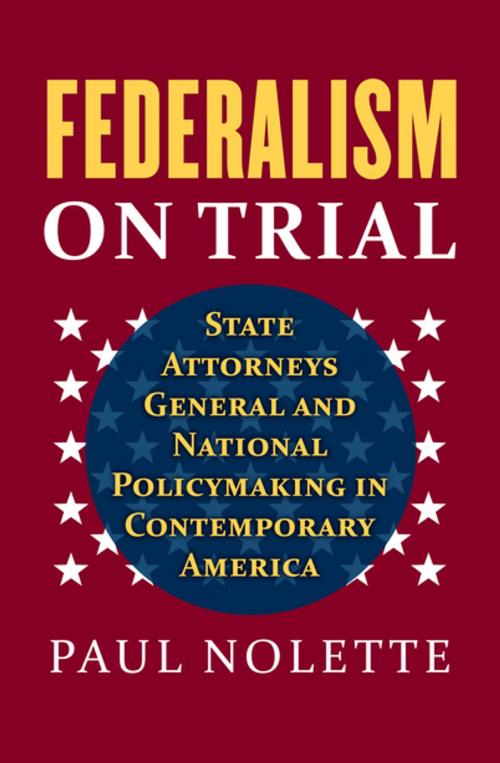Federalism on Trial
State Attorneys General and National Policymaking in Contemporary America
Nonfiction, Social & Cultural Studies, Current Events, Political Science, Government, Local Government, Public Policy| Author: | Paul Nolette | ISBN: | 9780700620906 |
| Publisher: | University Press of Kansas | Publication: | March 23, 2015 |
| Imprint: | University Press of Kansas | Language: | English |
| Author: | Paul Nolette |
| ISBN: | 9780700620906 |
| Publisher: | University Press of Kansas |
| Publication: | March 23, 2015 |
| Imprint: | University Press of Kansas |
| Language: | English |
"It is one of the happy incidents of the federal system," Justice Louis Brandeis wrote in 1932, "that a single courageous state may, if its citizens choose, serve as a laboratory, and try novel social and economic experiments without risk to the rest of the country." It is one of the features of federalism in our day, Paul Nolette counters, that these "laboratories of democracy," under the guidance of state attorneys general, are more apt to be dictating national policy than conducting contained experiments. In Federalism on Trial, Nolette presents the first broadscale examination of the increasingly nationalized political activism of state attorneys general. Focusing on coordinated state litigation as a form of national policymaking, his book challenges common assumptions about the contemporary nature of American federalism.
In the tobacco litigation of the 1990s, a number of state attorneys general managed to reshape one of America's largest industries—all without the involvement of Congress or the executive branch. This instance of prosecution as a form of regulation is just one case among many in the larger story of American state development. Federalism on Trial shows how new social policy regimes of the 1960s and 1970s—adopting national objectives such as cleaner air, wider access to health care, and greater consumer protections—promoted both "adversarial legalism" and new forms of "cooperative federalism" that enhanced the powers and possibilities open to state attorneys general. Nolette traces this trend—as AGs took advantage of these new circumstances and opportunities—through case studies involving drug pricing, environmental policy, and health care reform.
The result is the first full account—far-reaching and finely detailed—of how, rather than checking national power or creating productive dialogue between federal and state policymakers, the federalism exercised by state attorneys general frequently complicates national regulatory regimes and seeks both greater policy centralization and a more extensive reach of the American regulatory state.
"It is one of the happy incidents of the federal system," Justice Louis Brandeis wrote in 1932, "that a single courageous state may, if its citizens choose, serve as a laboratory, and try novel social and economic experiments without risk to the rest of the country." It is one of the features of federalism in our day, Paul Nolette counters, that these "laboratories of democracy," under the guidance of state attorneys general, are more apt to be dictating national policy than conducting contained experiments. In Federalism on Trial, Nolette presents the first broadscale examination of the increasingly nationalized political activism of state attorneys general. Focusing on coordinated state litigation as a form of national policymaking, his book challenges common assumptions about the contemporary nature of American federalism.
In the tobacco litigation of the 1990s, a number of state attorneys general managed to reshape one of America's largest industries—all without the involvement of Congress or the executive branch. This instance of prosecution as a form of regulation is just one case among many in the larger story of American state development. Federalism on Trial shows how new social policy regimes of the 1960s and 1970s—adopting national objectives such as cleaner air, wider access to health care, and greater consumer protections—promoted both "adversarial legalism" and new forms of "cooperative federalism" that enhanced the powers and possibilities open to state attorneys general. Nolette traces this trend—as AGs took advantage of these new circumstances and opportunities—through case studies involving drug pricing, environmental policy, and health care reform.
The result is the first full account—far-reaching and finely detailed—of how, rather than checking national power or creating productive dialogue between federal and state policymakers, the federalism exercised by state attorneys general frequently complicates national regulatory regimes and seeks both greater policy centralization and a more extensive reach of the American regulatory state.















